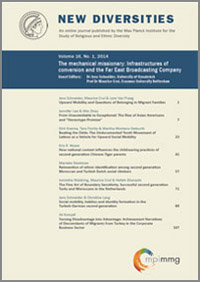Understanding Diaspora Organisations in European Development Cooperation – Approaches, Challenges and Ways Ahead
by Nauja Kleist (Danish Institute for International Studies)
This article examines how Northwestern European development aid agencies support the development activities of diaspora organisations, especially in fragile situations. The article interrogates the perceived relationship between diaspora involvement and development, and how this perception is reflected in the ways in which development agencies collaborate with diaspora organisations through mainstream funding schemes, special diaspora initiatives and network support. Three tendencies are identified: a high emphasis on technical fixes; a tension between perceptions of diaspora organisations as special development agents and a mainstreaming ideal; and, finally, that diaspora organisations appear as particularly risky recipient groups to some development professionals because of their personal involvement in the country of origin. The article further argues that policy incoherence as well as underlying notions of development as planned, professionalized and based on a sedentary bias contribute to the marginal role diaspora organisations currently play in the professional development field.
Keywords: development cooperation, development policies, diaspora, diaspora organisations, migration-development nexus, policy incoherence
Suggested bibliographic reference for this article:
Kleist, N. (2014). Understanding Diaspora Organisations in European Development Cooperation – Approaches, Challenges and Ways Ahead. New Diversities, 16(2), 55-69. Retrieved [todaysdate] from https://newdiversities.mmg.mpg.de/?page_id=1732
|
